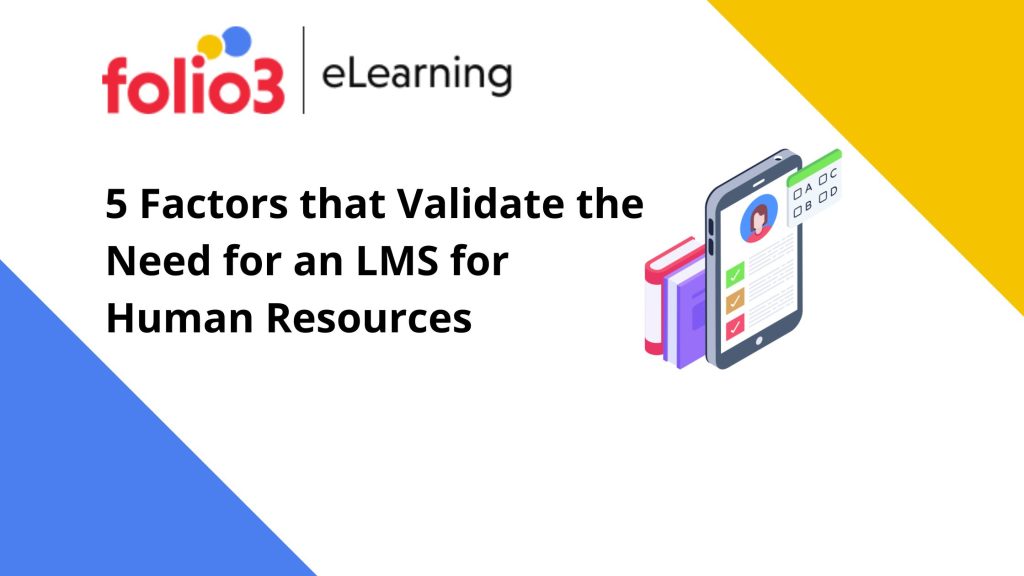
Employees can make or break an organization, so keeping your employees motivated is vital. Training opportunities come as a reliable source of motivation because employees see training as a growth opportunity. According to them, a company that invests in training cares about the employees. This makes training and development one of the most important functions of the Human Resource Department in organizations.
Handling training and development for hundreds and thousands of employees is a tedious job for the HR department, to say the least, and this is where the need for an LMS for Human Resources arises. But before we dive right into the factors that validate the need for a Learning Management System, let us first discuss why an LMS is necessary in modern times and how it can help the HR department.

The Need For a Good HR LMS Platform
A Learning Management System helps you handle the administration, delivery, and automation of the training programs you offer to your employees. This helps the Human Resource department focus on more important tasks than constantly monitoring training, employee progress, and evaluation of these trainings.
The human resource department has several responsibilities. One is to ensure that new employees know the organization’s culture and have the necessary skills to meet work demands. Other than handling training, LMS development for HR also fulfills these needs and facilitates the department’s onboarding process.
Artificial intelligence is making Learning Management Systems more intuitive and self-sufficient with minimal involvement from the HR team, freeing them up for other tasks that require their attention. Moreover, research confirms that nearly 55% of companies that invested in e-learning solutions and technologies saw remarkable progress in the productivity of their employees. Most companies believe that learning enhances employee performance.
Here are some of the five factors that validate the need for an LMS learning portal for HR:
1) Improved, Premium Quality Training at Scale
An LMS highly increases the scope of training as opposed to in-person training. For instance, as the company grows, in-person training will keep getting more difficult to handle, especially with the rising demands and the increase in trainees. Moreover, when a company wants to ensure that new and existing employees are trained to follow current compliance protocols, LMS development for HR can be a huge help.
Physical training has become a burden for the HR department because it takes so much time and energy to arrange a training venue, access trainers, printouts, and projectors, and even ensure everyone reaches on time. A reliable LMS learning portal for HR makes things easier for the HR department and makes the actual training much more efficient. More employees turn up for the training because they can do so at their convenience. The training can include different mediums like lectures, videos, interactive games, and even simulations. You need an LMS for Human Resources if you want your Human Resource department to remain motivated and be able to offer courses according to the unique needs of your employees.
2) Improved Knowledge Retention
Consistency is the key to retaining knowledge and acquiring expertise in any particular skill. Traditional training cannot possibly have the same consistency as online training, making it redundant after some time. This causes the employees’ motivation to learn new skills to go down because they don’t remember what they learned in the previous training. Moreover, an LMS enables the employees to be actively engaged with their learning subject, which also helps with knowledge retention. Any questions the employees may have are answered in real-time, maintaining interest for them and motivating them to learn more.
Even research studies imply that LMS development for HR helps in improved knowledge retention for the employees being trained. Research indicates that learners trained with the help of an LMS or online solution can retain 60% of the knowledge imparted to them, while those given physical training only retain around 10%. This is because an LMS helps free up the HR department, ensuring seamless quality training delivery from reliable sources. Also, online training ensures that the learners can recap and review what they have missed. They don’t have a similar rewind button for physical training.
3) Integration with HR System Leads to Minimized Costs & Maximized Efficiency
Training and development should ideally be a business driver since it helps arm your employees with the knowledge and skills they need to perfect their tasks and do their jobs well. This way, it also empowers your HR team. It encourages them to participate actively and invest in employee training to lead them to success and, in turn, be successful.
However, when there is no integration between the systems, achieving this becomes highly unlikely. The use of disparate systems can increase complexity and operating costs because HR has to enter the data for performance monitoring, etc., manually. This reduces their motivation and job satisfaction and even reduces organizational efficiency.
An integrated LMS for Human Resources helps leverage all the automation capabilities and minimizes additional time and costs spent on mundane, routine tasks by the HR team. This includes the time they previously spent on constantly correcting errors in the system.
4) Real-Time Feedback & Reporting
One major purpose of training is to maximize employee productivity and efficiency to help maximize revenue. The training programs become useless if the employees do not benefit from the training and use that knowledge to help do their tasks. This is where feedback and reporting come in. With an intuitive LMS for Human Resources, the HR department can get all the updates on employees’ performance and how the training program is helping in real time.
An LMS learning portal for HR makes performance evaluation and feedback very easy for the HR department. They can easily map out any inefficiencies in training to enhance the learning experience for the employees because they get all the information in a report format, whether it’s the employee performance evaluation and progress or anonymous feedback on the training program.
5) Helps Handle Copious Amounts of Data
This is easily the most important factor because, as mentioned earlier, it becomes increasingly difficult for the HR department to handle large amounts of data to conduct training for all employees when organizations grow and scale. Training requires a huge amount of data and resources to be verified, collected, managed, maintained, and stored. Moreover, manual data entry and processes are prone to errors that can create discrepancies, and having to correct those errors repeatedly.
This can be handled easily and effortlessly with even fairly simple LMS development for HR. An LMS automates many processes and integrates all the employee information with the HR system, minimizing work for the HR department. This means that not only is there no more chance of duplicate data, but it also helps save the department’s effort and time, letting them focus on other more pressing matters.
Conclusion
We hope these five factors have helped you understand the increasing need for an LMS for Human Resources. It helps the HR department keep motivated and focus on more important tasks. It makes handling corporate training so much easier for them by letting them bring more customization and flexibility into the system. If you aren’t convinced and need more information about the perfect LMS for your organization, schedule a free consultation with us, and we can show you exactly how the right LMS can help you succeed.









